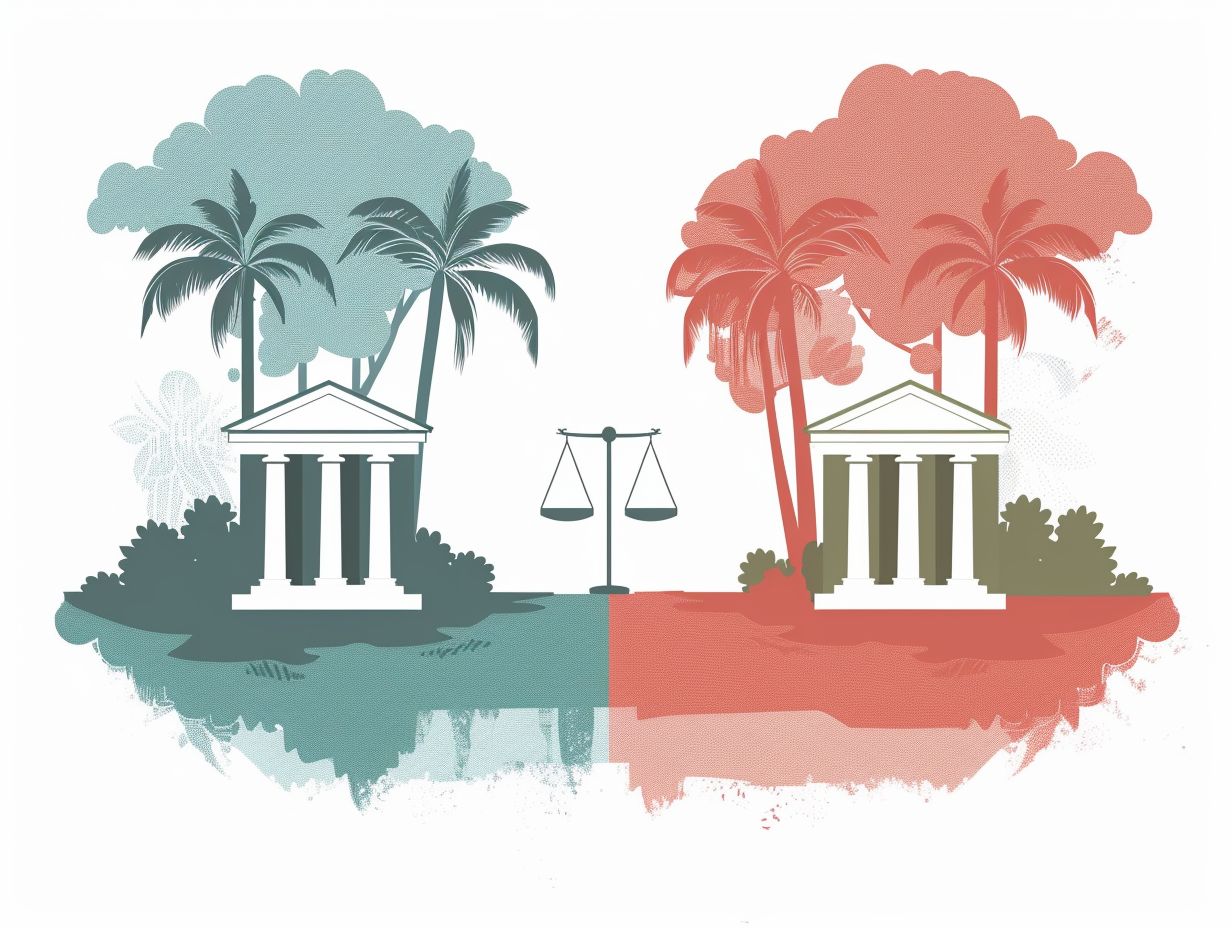Estate planning is a crucial aspect of financial planning that involves navigating a complex web of federal and state laws.
In Florida, understanding the implications of federal laws such as the Estate Tax, Gift Tax, and Generation-Skipping Transfer Tax is essential. These laws can have a significant impact on estate planning for Florida residents, but there are strategies to minimize their effects.
State laws such as the Florida Probate Code and Homestead Exemption also play a role in shaping estate plans.
We explore the key federal and state laws that affect Florida estate planning and discuss the essential elements of a comprehensive estate plan. An estate planning attorney can provide valuable assistance in navigating these complex laws.
Key Takeaways:
- Federal laws such as the estate tax, gift tax, and generation-skipping transfer tax can have a significant impact on Florida estate planning.
- These laws may not apply to all Florida residents, but it is important for all residents to understand how they can minimize their impact and create an effective estate plan.
- An estate planning attorney can provide valuable guidance and assistance in navigating the complex interplay between federal and state laws in Florida estate planning.
What Are the Federal Laws That Affect Florida Estate Planning?
Federal laws have a notable impact on Florida estate planning by regulating how assets are taxed and transferred. The federal estate tax is a major consideration for many individuals, with the Internal Revenue Service (IRS) overseeing the administration of these taxes. This oversight can have a significant influence on the financial planning strategies used to protect one’s estate.
What is the Federal Estate Tax?
The federal estate tax is a tax imposed on the transfer of the estate of a deceased person, overseen by the Internal Revenue Service (IRS). This tax is calculated based on the total value of the estate at the time of death. As of 2021, the federal estate tax rate is 40% for estates exceeding $11.7 million for individuals or $23.4 million for married couples.
It’s important to note that not all estates are subject to this tax due to exemptions. In Florida, residents are not subject to a state-level estate tax but still need to consider federal implications. The estate tax can significantly reduce the value of assets transferred to beneficiaries, necessitating careful estate planning to minimize its impact.
What is the Federal Gift Tax?
The federal gift tax is a tax on the transfer of assets from one individual to another while the giver is still alive, and it is regulated by the IRS.
This tax is designed to prevent potential abuses in transferring wealth and to ensure that gifts above a certain value are subject to taxation. As of 2021, the annual gift tax exclusion permits individuals to gift up to $15,000 per recipient without facing any tax implications. There is also a lifetime gift tax exemption that protects gifts exceeding the annual exclusion limit from being taxed.
Understanding these limits and exemptions is essential for effective estate planning, as they can impact how assets are distributed while minimizing tax obligations for both the giver and the recipient.
What is the Generation-Skipping Transfer Tax?
The generation-skipping transfer tax (GSTT) is a federal tax on transfers of assets that skip a generation, such as gifts or bequests to grandchildren, overseen by the IRS.
This tax was established to prevent individuals from avoiding estate taxes by passing assets directly to grandchildren or other beneficiaries who are two or more generations below them.
In Florida, where estate planning is a crucial aspect of financial management, the GSTT can significantly impact how individuals structure their estate plans to minimize tax liabilities and ensure a smooth transfer of wealth to future generations.
By navigating the complexities of this tax, individuals can make informed decisions about asset allocation and distribution, considering the long-term financial well-being of their heirs.
How Do These Federal Laws Impact Florida Estate Planning?
Federal laws, such as estate, gift, and generation-skipping transfer taxes, have a significant impact on Florida estate planning. These laws determine how assets are taxed and passed on, influencing financial planning strategies. It is important to adhere to IRS regulations to reduce tax obligations and guarantee that beneficiaries receive the highest possible inheritance.
Do These Laws Apply to All Florida Residents?
Federal estate planning laws, including taxes regulated by the IRS, apply to all Florida residents, though the impact can vary based on the size of the estate and available exemptions.
It is essential for Florida residents to be aware of these laws because they have a direct influence on how their estates are managed and distributed upon their passing. Certain exemptions, such as the federal estate tax exemption, can significantly impact the taxation of an estate in Florida.
The IRS plays a crucial role in enforcing these regulations and ensuring compliance among residents, providing guidance and assistance when needed. Understanding the nuances of federal laws can help individuals make informed decisions about their estate planning strategies in Florida.
How Can Florida Residents Minimize the Impact of These Laws?
Residents in Florida have the opportunity to mitigate the effects of federal estate planning laws through strategic financial planning and the use of various exemptions and trust arrangements.
When considering the distribution of assets, it is important to think about establishing irrevocable trusts to safeguard wealth and lessen tax obligations. Making use of gift tax exemptions can also be an effective approach, enabling individuals to gift assets up to a specific amount each year without facing gift taxes.
Seeking advice from financial professionals with expertise in estate planning can offer valuable assistance in organizing your estate in a tax-efficient way.
By keeping up-to-date on evolving tax laws and implementing these strategies carefully, individuals can enhance the protection of their wealth and legacies for future generations.
What Are the State Laws That Affect Florida Estate Planning?
State laws in Florida, such as the Florida Probate Code, Homestead Exemption, and Elective Share, play a significant role in estate planning by establishing particular guidelines for the management, distribution, and protection of property and assets.
What is the Florida Probate Code?
The Florida Probate Code comprises laws that regulate the administration of a deceased individual’s estate, covering aspects such as asset distribution and debt resolution.
It acts as a detailed legal structure that delineates the processes and regulations for managing the transfer of property and assets upon an individual’s death. By defining the necessary procedures for handling the estate of the deceased, the Probate Code facilitates the proper and just distribution of inheritances to the rightful heirs.
It plays a vital role in specifying how debts and estate-related taxes should be resolved before the remaining assets are divided among the beneficiaries.
What is the Florida Homestead Exemption?
The Florida Homestead Exemption is a legal provision that offers significant tax benefits and asset protection for an individual’s primary residence.
This exemption allows homeowners to decrease the taxable value of their property, resulting in lower property taxes. Besides providing financial advantages, it also protects the primary residence from specific creditors, making it an essential aspect of estate planning. By safeguarding the family home, individuals can ensure the security of their assets for future generations.
It is crucial to recognize that the Homestead Exemption in Florida interacts with other state and federal laws, affecting how property ownership is taxed and protected in different situations.
How Do These State Laws Interact with Federal Laws?
State laws in Florida, like the Homestead Exemption and the Probate Code, intersect with federal laws by offering extra protections and regulations that influence the estate planning process as a whole.
The Homestead Exemption in Florida, for example, shields a primary residence from specific creditors’ claims, offering a substantial benefit in asset protection.
This state provision can clash with federal tax laws when assessing the ramifications for estate taxes on inherited property. Recognizing these interactions is essential for individuals aiming to efficiently handle their assets and reduce tax responsibilities through thorough estate planning strategies.
What Are the Essential Elements of a Florida Estate Plan?
The crucial components of a Florida estate plan consist of important legal documents like Wills, Trusts, a Power of Attorney, and healthcare directives. Together, these documents ensure that an individual’s wishes are honored and their assets are handled in accordance with their planning.
What is a Will?
A Will is a legal document that outlines how an individual’s assets should be distributed to their beneficiaries after their death. It serves as a crucial instrument in estate planning, allowing the individual, also known as the testator, to specify their wishes regarding the transfer of property, guardianship of minor children, and even funeral arrangements.
Key components of a Will typically include the identification of beneficiaries, appointment of an executor to carry out the instructions, and the distribution of specific assets or properties. Having a Will in place not only ensures that your assets are distributed according to your desires but also helps in minimizing family disputes and potential confusion during the probate process.
What is a Trust?
A trust is a legal arrangement in which one party holds assets on behalf of beneficiaries, providing flexibility in managing and distributing the estate.
There are different types of trusts that can be used in estate planning, such as revocable trusts, irrevocable trusts, and testamentary trusts. Each type serves specific purposes, whether it’s to avoid probate, protect assets from creditors, or minimize estate taxes.
A trustee, who is appointed to oversee the trust, plays a crucial role in ensuring that the assets are managed and distributed according to the terms of the trust. Beneficiaries, on the other hand, are the individuals or entities who will ultimately benefit from the trust assets.
What is a Power of Attorney?
A Power of Attorney is a legal document that grants someone the authority to make financial decisions on behalf of another person.
There are different types of Power of Attorney, each serving a distinct purpose. A General Power of Attorney provides broad authority for the appointed individual to manage various financial matters.
On the other hand, a Limited Power of Attorney restricts the scope of decisions the agent can make, focusing on specific tasks or time frames. A Durable Power of Attorney remains effective even if the individual granting it becomes incapacitated, ensuring continuity in decision-making.
Including a Power of Attorney as part of your estate plan is essential for ensuring that your affairs are handled according to your wishes. Failing to have a Power of Attorney in place can lead to your financial matters being decided by the court, causing delays, confusion, and potentially unwanted outcomes.
What is a Healthcare Surrogate?
A Healthcare Surrogate designation is a legal document that appoints someone to make healthcare decisions on behalf of an individual if they are unable to do so.
This role is critical, especially in situations where a person becomes incapacitated and cannot express their wishes regarding medical treatment. The Healthcare Surrogate is entrusted with ensuring that the individual’s preferences and values are honored during medical decision-making processes.
Responsibilities include advocating for the person’s interests, consulting with healthcare providers, and making informed choices in line with the individual’s known healthcare preferences. By designating a Healthcare Surrogate in an estate plan, individuals can have peace of mind knowing that their healthcare wishes will be respected and followed even if they are unable to communicate them.
What is a Living Will?
A Living Will is a legal document that details an individual’s preferences regarding medical treatment and end-of-life care. It provides guidance for healthcare professionals and loved ones in the event that the individual is unable to communicate their wishes.
In contrast to a traditional Will, which addresses asset distribution post-death, a Living Will specifically pertains to healthcare decisions. This document allows individuals to specify their preferences for life-sustaining treatments, organ donation, and other essential medical interventions.
By drafting a Living Will, individuals can ensure that their values and beliefs are honored during significant health crises, offering peace of mind for both themselves and their families.
How Can an Estate Planning Attorney Help with Federal Laws in Florida?
An estate planning attorney can provide essential guidance and consultation on navigating federal laws in Florida, ensuring compliance with IRS regulations and optimizing tax strategies for asset protection. Their expertise allows them to create tailored estate plans that address individual needs and goals, whether it involves wills, trusts, powers of attorney, or healthcare directives.
By engaging professional services like those offered by the Siegel Law Group, individuals can benefit from expert advice on structuring their estate to minimize tax liabilities and maximize wealth transfer to future generations. Estate planning attorneys also play a crucial role in safeguarding assets from potential creditors and ensuring a smooth transition of wealth according to their clients’ wishes.
Frequently Asked Questions
How do federal laws impact estate planning in Florida?
Federal laws, such as tax codes and regulations, can have a significant impact on estate planning in Florida. These laws can affect the taxation of assets, the distribution of wealth, and other important aspects of estate planning.
What are some common federal laws that impact Florida estate planning?
Some common federal laws that impact Florida estate planning include the Internal Revenue Code, the Employee Retirement Income Security Act (ERISA), and the Health Insurance Portability and Accountability Act (HIPAA).
Do federal laws always supersede state laws in Florida estate planning?
No, federal laws do not always supersede state laws in Florida estate planning. In some cases, state laws may provide more favorable or specific regulations for estate planning than federal laws.
How can I ensure my estate plan complies with both federal and state laws in Florida?
It is important to consult with a knowledgeable estate planning attorney who is familiar with both federal and state laws in Florida. They can help you create a comprehensive plan that complies with all applicable laws and regulations.
What are some potential consequences of not considering federal laws in my Florida estate planning?
If you do not consider federal laws in your estate planning, you may face unexpected tax liabilities, delays in the distribution of assets, or challenges to the validity of your plan. It is important to stay informed and work with a professional to ensure your estate plan is legally sound and effective.

























Rate this article:
Average rating 0 / 5. Vote count: 0
No votes so far! Be the first to rate this post.
No Comments yet!